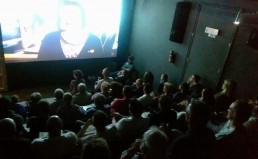Last Friday the LGL logged a notification to the Vilnius City Municipality on the planned date, time and location of the upcoming Baltic Pride 2013 March for Equality in Vilnius. The March for Equality is planned to take place on 27 July 2013 (Saturday) on the main avenue, i.e. Gediminas Avenue, in the downtown of Vilnius. Following the procedure under the Law on Public Meetings, the LGL representatives were invited by the municipal authorities to sit in a common meeting in order to negotiate date, time and location of the proposed event. The LGL has invited an independent judicial officer to make an audio record of the factual circumstances of the meeting.
The municipal authorities have outlined the following reason for objecting to organizing the March for Equality on the main avenue in the downtown of Vilnius:
(a) it would be difficult to secure the safety of the participants, because there are many high buildings on the avenue and some attacks could be organized through the windows;
(b) there are many cafes, bars and hotels in the avenue; they would need to be temporarily closed during the March for Equality (due to the security reasons), thus resulting in economic loss by the third parties;
(c) following the established practise from 2010, the LGL should be satisfied with the site in the Upės Street, because it is a green area close to the city centre.
Following the above expressed concerns, the municipal authorities have provided two alternatives – either to change the nature of the event (i.e. to organize a rally in one of the city squares, but not a march), or to change the location of the event (i.e. to organize the event in the Upės Street). While the LGL representatives have dismissed the first option, they expressed negative attitudes towards the second proposal as well.
Several hours after the meeting, the Vilnius City Municipality reported on its website that the proposed location of the March for Equality 2013 is a site in the Upės Street. The LGL had not had received an official decision by the municipal authorities by then.
The Board Chair of the LGL, Vladimir Simonko, disagrees with the arguments, raised by the municipal authorities. According to him, there is no need to close any commercial establishments on the Avenue during the March for Equality. On the contrary, the presence of Pride participants could result in additional income by the local businesses. In addition to this, the majority of the buildings on the Avenue are of an administrative nature; therefore they would not be accessible on Saturday. Finally, the Chair questions the fact, namely why certain meetings and assemblies are allowed to proceed on the Avenue, while it is unavailable for the LGBT community. It has been noted, that the organization of the Baltic Pride 2010 in the Upės Street was back then a compromise with the municipal and national authorities rather than an effective exercise of the right to freedom of assembly for the LGBT community.
The LGL will consider the possibility of appealing against this administrative decision before the national courts. The organization has one month to lodge an appeal and it will use this time in order to consult with lawyers, international partners and other relevant stakeholders. It has to be noted that the notification procedure with the municipal authorities was initiated seven months prior to the actual Pride events, bearing in mind that certain institutionalized obstacles might arise.
The LGL is actively supported by the MP Dalia Kuodytė, who was responsible for the new edition of the Law on Public Meetings. The new law establishes a procedure of notification instead of a procedure of authorization, i.e. the interested parties are obliged to notify the municipal authorities about the planned assemblies rather than to ask for permission.
Taken the upcoming Lithuanian EU Presidency into account, the LGL was expecting a constructive dialogue with the municipal authorities. The organization believes that this is a unique opportunity to present Lithuania as a human rights respecting society, which guarantees the effective exercise of the right to freedom of peaceful assembly for all its citizens without discrimination. However, it seems that a little progress has occurred in the attitudes by the public authorities after the first Baltic Pride in 2010.



